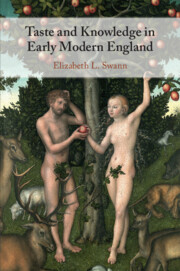Book contents
- Taste and Knowledge in Early Modern England
- Taste and Knowledge in Early Modern England
- Copyright page
- Dedication
- Contents
- Figures
- Acknowledgements
- Note on the Text
- Introduction
- Chapter 1 ‘To dream to eat Books’
- Chapter 2 Anatomizing Taste
- Chapter 3 From Eve’s Apple to the Bread of Life
- Chapter 4 ‘Those Fruits of Natural knowledge’
- Chapter 5 ‘Honey secrets’
- Afterword
- Bibliography
- Index
Introduction
Published online by Cambridge University Press: 08 October 2020
- Taste and Knowledge in Early Modern England
- Taste and Knowledge in Early Modern England
- Copyright page
- Dedication
- Contents
- Figures
- Acknowledgements
- Note on the Text
- Introduction
- Chapter 1 ‘To dream to eat Books’
- Chapter 2 Anatomizing Taste
- Chapter 3 From Eve’s Apple to the Bread of Life
- Chapter 4 ‘Those Fruits of Natural knowledge’
- Chapter 5 ‘Honey secrets’
- Afterword
- Bibliography
- Index
Summary
In his Athenae Oxonienses (1691–92), a history of writers and bishops educated at the University of Oxford between 1500 and 1690, the antiquary Anthony Wood includes a brief description of the life of the scholar, educational reformer, and sometime Dean of St Paul’s, John Colet. A humanist luminary, Colet was ‘exquisitely Learned’, being (as Wood comments approvingly) ‘no stranger to Plato and Plotinus’, but somewhat indifferent to their scholastic commentators: ‘Schoolmen, he seemed not to delight in.’ Colet was also profoundly pious, taken by later reformers as an early proponent of their cause: the churchman and historian Thomas Fuller calls him ‘a Luther before Luther’. After his death from a sweating sickness in 1519, Colet’s achievements were acknowledged, as Wood reports, by the construction of ‘a comly Monument set over his Grave’ in a wall of St Paul’s, which stood ‘whole and entire till 1666 [and] was then consumed in the dreadful Conflagration that happened in the City of London’. About fourteen years later, the wall that contained Colet’s body was taken down, and his coffin was revealed. Wood describes how, ‘out of curiosity’, the politician Edmund Wyld and the mathematical instrument maker Ralph Greatorex paid the ruins a visit. Encountering Colet’s newly uncovered burial place, Wyld and Greatorex ‘did thrust a probe or little stick into a chink of the Coffin, which bringing out some moisture with it, found it of an ironish tast, and fancied that the body felt soft and pappy like Brawn’.
- Type
- Chapter
- Information
- Taste and Knowledge in Early Modern England , pp. 1 - 36Publisher: Cambridge University PressPrint publication year: 2020



